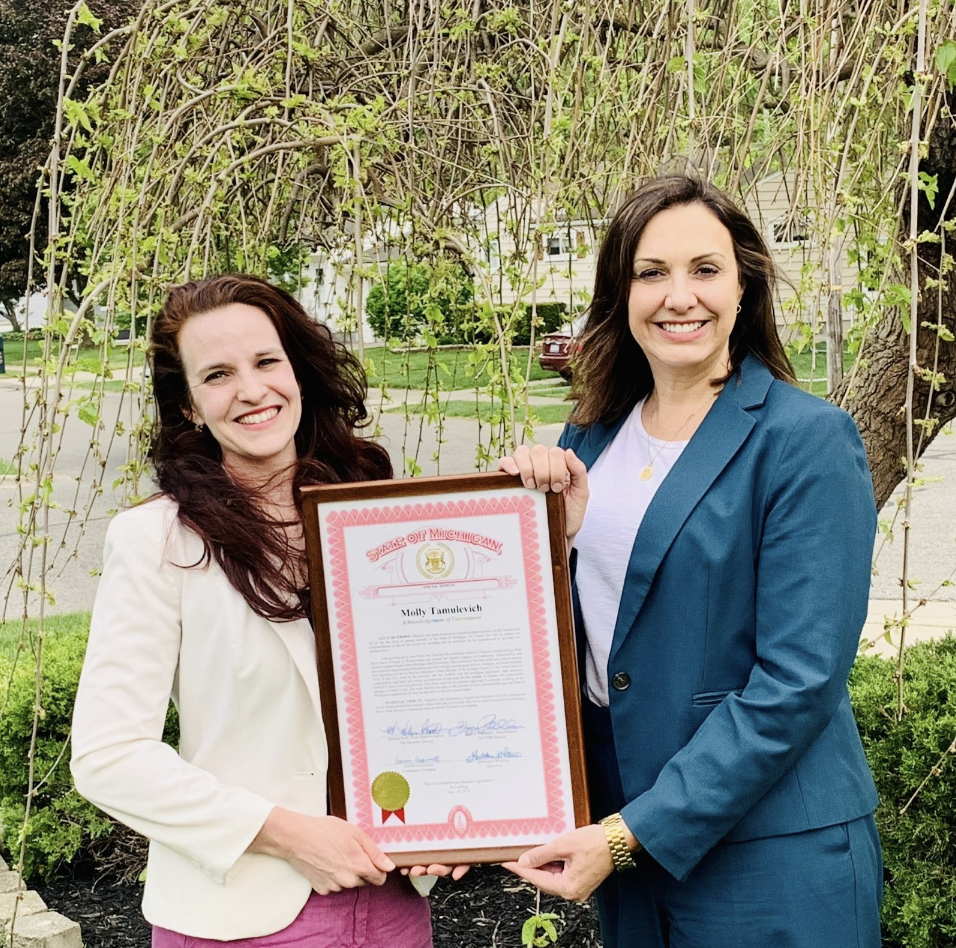Dear Neighbors,
I hope this newsletter finds you and your family safe and healthy. It’s been a busy few weeks in the Senate as we worked to finalize our budget recommendations, which include historic investments in education, our economy, and other much-needed programs that will continue to make Michigan a great place to call home.
Featured in this newsletter:
- Legislative Update
- Community Updates
- Summer 2023 Job Market Forecast for Michigan Teens (Ages 16–19)
- End of Federal COVID-19 Public Health Emergency Brings Changes to Insurance Coverage for Michiganders
- Helping Medicaid members keep their coverage
- Applications Now Being Accepted for the Fostering Futures Scholarship
- Imposter Scams Take on New Forms: Missed Jury Duty and Demand for Payment Scams
Should you need any help, please do not hesitate to contact my office by phone at (517) 373-7350 or by email at SenDPolehanki@senate.michigan.gov.
Working for you,

Dayna Polehanki
State Senator
District 5
Legislative Update
Protecting Michiganders from Gun Violence
We passed our third gun violence protection bill into law on Monday: Extreme Risk Protection Order or “Red Flag” law.
“We must act because week after week in America we see grim, familiar headlines,” Gov. Whitmer said at a bill signing ceremony flanked by gun safety advocates including former Congresswoman and gun violence survivor Gabby Giffords. “The shooters from Oxford and MSU both showed concerning behavior beforehand.”
Community Updates

It is my pleasure to help City of Inkster – City Hall and Patrick Wimberly-Mayor City of Inkster renovate an old library into a brand-new cultural arts center. I also presented a tribute to Saif Alsenad for his dedication to making Inkster thrive.

Molly Tamulevich is departing her position as Michigan State Director of the Humane Society of the United States as she is moving to Australia this week. Molly has been a fierce and fearless advocate for animals — wild and domestic, big and small, cute and ugly–during my time in the Michigan Senate. Her compassion and advocacy for animals know no bounds. Molly has led legislation that expanded the size of chicken cages, required the adoption of lab dogs and cats, and prevented unneeded wolf hunts here in Michigan. She has traversed the state many times in this position and is often the lone voice for animals at NRC, DNR, or legislative committee hearings. Much respect, Molly, and safe travels to Australia. You will be truly missed!
Summer 2023 Job Market Forecast for Michigan Teens (Ages 16–19)
The Michigan Department of Technology, Management & Budget’s Michigan Center for Data and Analytics released its summer (June–August) teen employment forecast for 2023. For more information, including resources for finding summer employment, click here.
End of Federal COVID-19 Public Health Emergency Brings Changes to Insurance Coverage for Michiganders
The Michigan Department of Insurance and Financial Services (DIFS) is alerting consumers that there may be changes to their health insurance coverage for COVID-related testing and treatments now that the federal COVID-19 Public Health Emergency (PHE) has ended.
Federal law required that many health services related to COVID-19, including testing and vaccinations, had to be covered at no cost for the duration of the PHE. Many Michiganders may now have to pay out-of- pocket for some COVID-related care. For more specific information about different types of medical care that have been affected by the ending of the PHE, see below:
At-Home and Laboratory COVID Tests:
- Private Insurers: The federal mandate requiring health insurers to provide no-cost coverage for COVID-19 testing, including at-home tests, has ended. Most people with health insurance will continue to have coverage for laboratory COVID-19 tests, subject to the plan’s cost sharing. At-home testing for COVID-19 is an eligible medical expense for flexible spending arrangements (FSAs) and health savings accounts (HSAs). Michiganders should check with their plan for more details.
- Medicare: Medicare is no longer required to provide coverage for at-home COVID-19 testing. Medicare Part B participants can still obtain laboratory COVID-19 testing, with authorization by a medical provider, without out-of-pocket cost. Medicare Advantage participants may have additional flexibility regarding COVID-19 testing. Michiganders should check with their plan for more details.
- Medicaid: Under federal law, Medicaid and MIChild participants can obtain at-home and laboratory COVID-19 tests through September 30, 2024.
COVID-19 Treatments:
Private insurers: Treatment for COVID-19 will continue to be covered but insurers are now able to apply cost sharing, such as deductibles and coinsurance, and require prior approval for these treatments. Michiganders should confirm coverage with their insurer or plan before seeking treatment.
Medicare: Medicare beneficiaries may have to pay for a portion of their COVID-19 care as required by their plan.
Medicaid: Medicaid and MIChild are required to cover all drugs for the treatment or prevention of COVID–19 with no cost sharing for enrollees through September 30, 2024.
COVID-19 Vaccinations:
COVID-19 vaccinations continue to be supplied with no out-of-pocket cost by the federal government.
DIFS can help consumers with health insurance questions and complaints. Contact DIFS Monday through Friday from 8 a.m. to 5 p.m. at 877-999-6442 or Michigan.gov/HealthInsurance. For more information about the state’s Medicaid and MIChild programs, visit the MIBridges website.
Helping Medicaid members keep their coverage
Take action to avoid a gap in coverage
At the beginning of the COVID-19 pandemic, the federal government declared a Public Health Emergency (PHE), allowing Medicaid members to keep their health care coverage. Per recent federal legislation, eligibility renewals will start again in June. Monthly renewal notifications will be sent by mail beginning in May.
Following these steps will help determine if you still qualify:
- Make sure your contact information is up to date.
- Check mail or text messages for a letter.
- Complete your renewal form (if you get one).
If you’re a Medicaid member, learn more about how these changes may affect your health care coverage at Michigan.gov/2023benefitchanges.
Applications Now Being Accepted for the Fostering Futures Scholarship
Young adults who have experienced foster care on or after their 13th birthday are eligible to apply for a scholarship from the Fostering Futures Scholarship Trust Fund, according to the Michigan Department of Treasury.
The priority deadline for the Fostering Futures Scholarship application for academic year 2023-24 is August 1, 2023. Eligible students enrolled at a Michigan degree-granting college or university may now apply to receive scholarship funds for tuition, fees, room, board, books and supplies.
Fostering Future Scholarship Applicants with questions should contact the state Treasury Department’s Student Scholarships, Grants and Outreach area at mistudentaid@michigan.gov or call toll-free at 1-888-447-2687.
Imposter Scams Take on New Forms: Missed Jury Duty and Demand for Payment Scams
Michigan Attorney General Dana Nessel warns residents that they may be targeted by scammers claiming to be representing government entities.
The Department has received reports that a missed jury duty scam is currently being perpetrated in Oakland County. In this scam, fraudsters call unsuspecting residents and tell them that they have failed to appear for jury duty in federal court. The caller threatens the person with arrest if they don’t pay a “cash bond,” which has reportedly been as high as $5,000.
The Department has received reports that a missed jury duty scam is currently being perpetrated in Oakland County. In this scam, fraudsters call unsuspecting residents and tell them that they have failed to appear for jury duty in federal court. The caller threatens the person with arrest if they don’t pay a “cash bond,” which has reportedly been as high as $5,000.
So far, two complaints involving the missed jury duty scam have been reported to the Oakland County Sheriff’s Office. In both cases, the scammer claimed to be an Oakland County Sheriff’s deputy. Though in both instances cash was demanded to keep the call recipient out of jail, neither person paid. Instead, they turned themselves in only to discover that there were no arrest warrants sworn in either case.
Another imposter scam involves letters mailed to residents that appear to be from a state agency. The letters, which indicate that they are a “final demand for payment” related to a tax lien, threaten potential foreclosure unless payment is made.
One such letter sent to a nursing center in Detroit from the “Tax Lien Group Tax Processing Unit” indicated the “State of Michigan may seize [the] property for nonpayment of taxes.” The amount listed on the letter was $27,622, but no tax debt was owed to the State. The letter contained an 800-phone number commonly used to perpetrate similar scams.
The individuals perpetrating these scams may expand the deception to other agencies, such as the FBI, IRS, or some other state or federal government entity. If you are concerned that you are being targeted by a government imposter, you can protect yourself by doing your own internet research. Looking up the phone number for the government agency allows you to call and inquire without relying upon information provided by the scammer.
Residents can also simply do an internet search for the phone number they are being asked to call. This may help determine whether it belongs to a government agency or if it is one being used in scams. AG Nessel wants all Michigan residents to be on the alert so they can avoid being scam victims.
For more information about popular consumer scams, or if you believe you’ve been a victim, residents can contact the Consumer Protection Team Monday-Friday at 877-765-8388 or complete our online complaint form.

